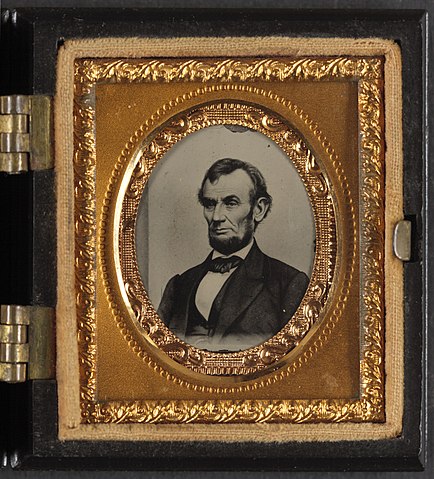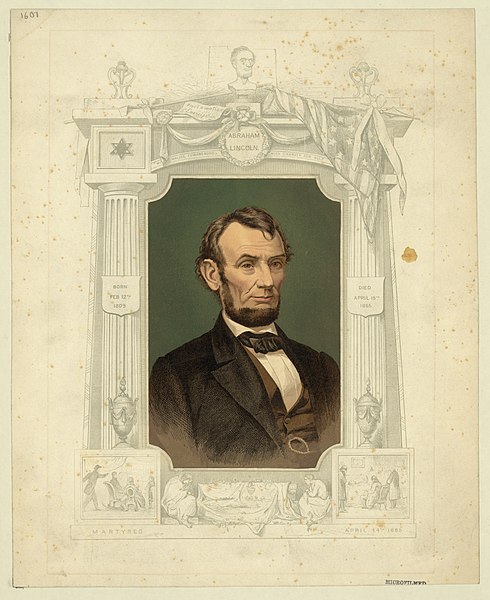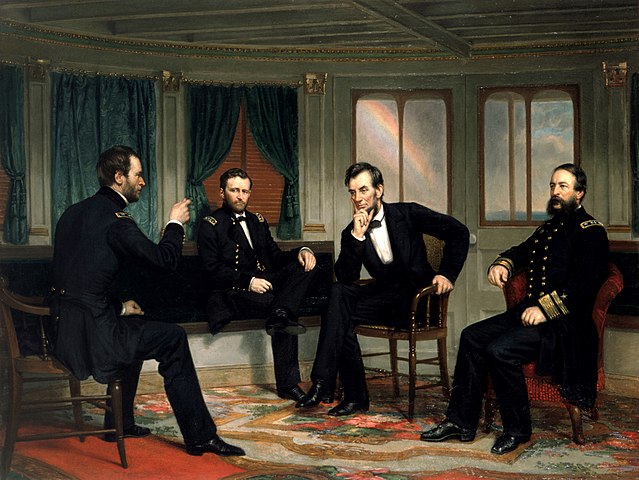
Each February 12, the birthday of President Abraham Lincoln is celebrated in the United States of America and internationally.
The TU Library owns several books about Abraham Lincoln, as well as collections of his writings. One of them, that should interest students in the Faculties of Political Science, History, Religion, Psychology, Sociology, Law, and related fields is The Black Heavens: Abraham Lincoln and Death.
It is shelved with the General Books in the Pridi Banomyong Library, Tha Prachan campus. Abraham Lincoln, who was the President of the United States of America during that nation’s Civil War, is one of its most celebrated leaders.
Lincoln has also been admired in Asia, for example by Dr. Sun Yat-Sen of China.
Sun Yat-Sen, provisional first president of the Republic of China, wrote about China’s future: We wish to see established in our country the system of government which the great Lincoln, in a memorable phrase, described as ‘government of the people by the people, for the people.’
In Japan, biographies of Lincoln written in Japanese language praised his strong self-discipline, studiousness, and honesty that allowed him to achieve much, despite humble origins. In 1903 a Japanese national textbook for the moral education of upper-level elementary schoolchildren featured Abraham Lincoln as the only foreigner used as an example.

Siam and Abraham Lincoln
Some TU students may recall that Abraham Lincoln’s most famous contact with Siam was in 1861, when he responded to a message from HM King Mongkut (King Rama IV). Carefully preserved in the US National Archives in Washington DC are materials sent by King Rama IV as ceremonial gifts from King Mongkut of Siam to President James Buchanan, who was President of the United States at the time of the start of the Civil War. By the time the messages arrived, President Lincoln had been elected. The gifts included a daguerreotype of HM King Rama IV with his daughter HRH Princess Wisutkrasat.
Daguerreotypes were the first commercially successful photographic process, named after Louis Jacques Mandé Daguerre, who invented it. Each daguerreotype is a unique image on a silvered copper plate. Among other gifts sent from the Kingdom of Siam to the United States were a sword, an elephant tusk, and a gold cigar case.
All of these items, including the elephant tusk, may be seen by students at the National Archives, among its vast collection. As the National Archives website explains, it contains
approximately 10 billion pages of textual records; 12 million maps, charts, and architectural and engineering drawings; 25 million still photographs and graphics; 24 million aerial photographs; 300,000 reels of motion picture film; 400,000 video and sound recordings; and 133 terabytes of electronic data. All of these materials are preserved because they are important to the workings of Government, have long-term research worth, or provide information of value to citizens.
In his letter sent in February 1861, King Mongkut noted that he had heard that the United States had no elephants. So he generously offered to donate several pairs of elephants to be
turned loose in forests and increase till there be large herds… since elephants being animals of great size and strength can bear burdens and travel through uncleared woods and matted jungles where no carriage and cart roads have yet been made… On this account, we desire to procure and send elephants to be let loose to increase and multiply in the continent of America.
As an innovative thinker, HM King Mongkut realized the importance of elephants as transportation at times of war, and also for constructing homes and cities. Since the United States was a relatively young country compared to Siam, HM King Mongkut considered that elephants might be helpful nation-building implements. Yet Siam lacked a vessel large enough to send elephants all the way to the United States. So his letter proposed:
In reference to this opinion of ours if the President of the United States and Congress who conjointly with him rule the country see fit to approve, let them provide a large vessel loaded with hay and other food suitable for elephants on the voyage, with tanks holding a sufficiency of fresh water, and arranged with stalls so that the elephants can both stand and lie down in the ship — and send it to receive them. We on our part will procure young male and female elephants and forward them one or two pairs at a time… Let them with all haste be turned out to run wild in some jungle suitable for them not confining them any length of time. If these means can be done we trust that the elephants will propagate their species hereafter in the continent of America.

Abraham Lincoln finally responded to this generous offer in February 1862, explaining in a friendly and appreciative way that the climate of the United States was not favorable for elephants to thrive. TU students may have seen the original letters by HM King Mongkut and President Abraham Lincoln on display last year at the Great and Good Friends exhibition in the Queen Sirikit Museum of Textiles at the Grand Palace in Bangkok:
To the King of Siam
February 3, 1862
Abraham Lincoln,
President of the United States of America.
To His Majesty Somdetch Phra Paramendr Maha Mongut,
King of Siam,
Great and Good Friend: I have received Your Majesty’s two letters of the date of February 14th., 1861.
I have also received in good condition the royal gifts which accompanied those letters,—namely, a sword of costly materials and exquisite workmanship; a photographic likeness of Your Majesty and of Your Majesty’s beloved daughter; and also two elephants’ tusks of length and magnitude such as indicate that they could have belonged only to an animal which was a native of Siam.
Your Majesty’s letters show an understanding that our laws forbid the President from receiving these rich presents as personal treasures. They are therefore accepted in accordance with Your Majesty’s desire as tokens of your good will and friendship for the American People. Congress being now in session at this capital, I have had great pleasure in making known to them this manifestation of Your Majesty’s munificence and kind consideration.
Under their directions the gifts will be placed among the archives of the Government, where they will remain perpetually as tokens of mutual esteem and pacific dispositions more honorable to both nations than any trophies of conquest could be.
I appreciate most highly Your Majesty’s tender of good offices in forwarding to this Government a stock from which a supply of elephants might be raised on our own soil. This Government would not hesitate to avail itself of so generous an offer if the object were one which could be made practically useful in the present condition of the United States.
Our political jurisdiction, however, does not reach a latitude so low as to favor the multiplication of the elephant, and steam on land, as well as on water, has been our best and most efficient agent of transportation in internal commerce.
I shall have occasion at no distant day to transmit to Your Majesty some token of indication of the high sense which this Government entertains of Your Majesty’s friendship.
Meantime, wishing for Your Majesty a long and happy life, and for the generous and emulous People of Siam the highest possible prosperity, I commend both to the blessing of Almighty God.
Your Good Friend, ABRAHAM LINCOLN.
Washington, February 3, 1862.
By the President:
WILLIAM H. SEWARD, Secretary of State.
*************************
Lincoln in Thailand today
Lincoln’s name still appears in Thailand due to the charitable work of the USS Abraham Lincoln CVN-72, a US Navy vessel. In 2014, US troops entertained children at the Pattaya Orphanage, supported by The HHN Foundation Thailand. Students at the Sotpattana School for the Deaf also met the USS Abraham Lincoln crew, who made donations of medical supplies, snacks, and money.

(All images courtesy of Wikimedia Commons)
